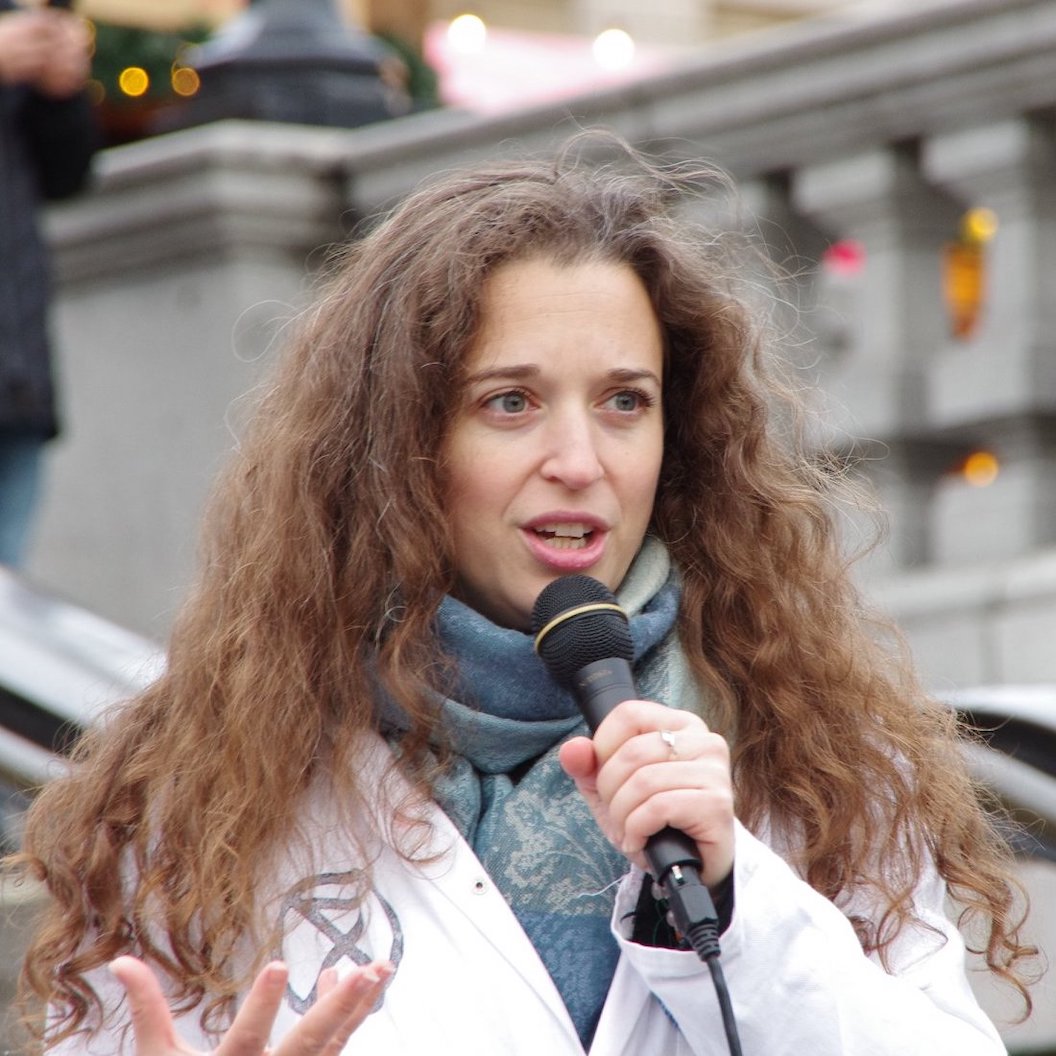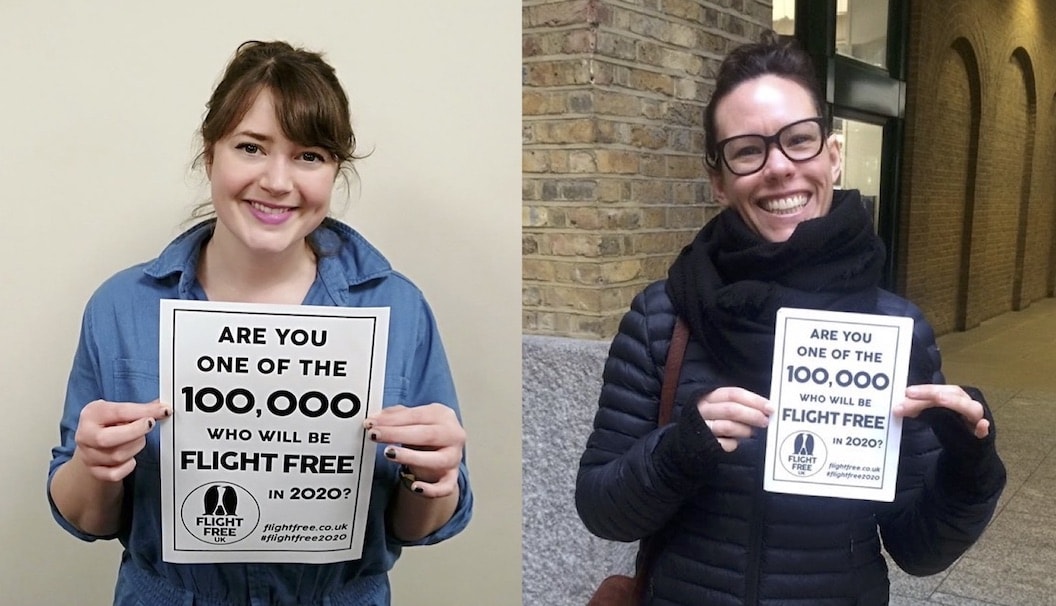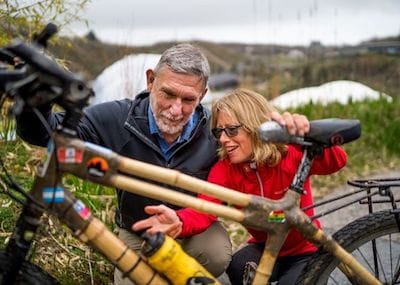This podcast is episode 6 of our #FlightFree2020 series. You can listen to the podcast, and access the rest of the series, at our podcast page.

This month's podcast is an interview with Dr Alexandra Jellicoe, a once frequent flier now turned train enthusiast, so we will be waxing lyrical about the wonders of train travel across Europe.
However, Europe has been in lockdown for the past couple of months, and even though borders seem to be opening up again, train travel might be difficult for some time. So we will also be talking about the value staying put, and how that might actually be a good thing for us and for the planet.
Alex has worked in the environment for most of her life, including with the WHO, creating water supplies for indigenous communities, small island states, the people who are on the front line of climate change at the moment. One of her last projects was with the Turkana tribes of northern Kenya who have been experiencing the effects of climate change for decades. One of the main ways this manifests itself is in rainfall: while there were once two rainy seasons a year, now there’s only one, which doesn't always come, which leads to terrible famine. And when the rains do come they are torrential, which just washes everything away including bridges and roads. The tribes live traditionally, with huts made from branches, and their infrastructure and livestock can’t withstand extremes of environment.
We don't always link our own lifestyles with the effects of climate change that are being seen around the world, especially with things like flying. And the same was true for Alex – so what changed?
Alex:
I was still flying frequently for work and for holidays up until the IPCC report was published in 2018, and I was so horrified by the contents. There was a huge transformation in me and a lot of people because of that report. I’d been trying to live sustainably in various other ways but hadn’t accounted for flying as being a huge part of my carbon footprint. I felt like couldn’t not talk about it any more, so I started to speak out and decided that if I was going to be talking about this I needed to be walking the talk as well. Flying is quite an easy and immediate change you can make, especially if you only fly for holidays.
I decided to start taking the train to travel to Europe, and I took a train down to Bologne and absolutely loved it. I loved it! The journey was one of the most meaningful parts of the holiday. Meeting people, seeing the countryside go by, and having productive working time were all a very positive part of the experience, and the idea of going back onto cattle class Ryanair/Easyjet sounds awful.
"The journey was one of the most meaningful parts of the holiday. I loved meeting people, seeing the countryside go by, and having productive working time."
Flight Free UK:
Almost everyone who talks about rail travel with us says how much of a better experience it is, for example, feeling a connection with the places you're travelling through, and being able to use the travel time usefully rather than spending hours standing in a queue. So it's not just a positive for the climate, it’s a massive positive for the traveller. The trouble is we're so used to booking flights – in the past 30 years, that has been the primary mode of travel for a huge number of people, particularly within Europe, which is somewhere that is very accessible overland. And when something becomes normal, it becomes very hard to break that habit – we just don’t consider the other options.
Here's an excerpt from the article Alex wrote for us:
“It’s not often you get bumped up to first class for a tenner. I can’t believe my luck. The seats are like armchairs, the pull-down table so generous I have plenty of space for my laptop, coffee and sandwich without having to channel my ninja skills, ready to catch a falling object at any moment. I managed to book last minute and the cabin is almost empty, the temperature perfectly controlled to ensure maximum comfort and I can stroll next door anytime I like for a hot meal. Oh, and did I mention the view?
As a passionate traveller, mother and environmental scientist I’ve completely reimagined how to explore the world. A holiday is no longer a jet to Mexico to lie by the beach for a week nor a quick weekend in Rome. I’ve rediscovered travel as something to be savoured rather than an inconvenience between home and holiday.”
Head to the Be Inspired page of our website to read the whole article.
So that changing perception of what travel is – something to be savoured rather than something to get us to our destination as quickly as possible – is something that has changed for Alex over the years.
Alex:
I used to jet off all around the world. I grew up abroad so it was very much part of my blood. Any time away from work I’d be asking myself, where can I go, what new experiences can I have? But they weren’t really experiences – they were quite stressful, with no time to enjoy the place, dashing in and out on 100 mph, which is the frenetic pace that we’re used to in the UK. We’ve taken that into our travel.
The idea of having to ‘get away’ in order to relax is a symptom of our lifestyles in the UK not fulfilling our needs. Since the 1980s we have been working harder and harder and there haven’t really been any benefits. It’s all sold to us by the travel agencies, that you deserve this holiday. When I first had kids I was stuck in that rut, that we have to go on holiday because that is where we relax and that is where we have a good time, so we would take our four children on holiday and just have the worst time. It didn't occur to me not to go! It took a few years for us to realise that we’d have a much better time just staying at home.
Flight Free UK:
Agreed! There’s an expectation that we must cram our holidays full of activity, or at least go somewhere that will make a good story or that we can talk about in the staff room. And it's natural to feel that, especially when we’re sold this by media and advertising, and even our social circle. Those bucket list locations are often the furthest away, mostly involving a high-emissions flight. But the benefits of travel, such as spending time with loved ones, meeting new people and experiencing new things can be found without really going very far at all.
One of the comments we received recently said, holidaying in the lakes and rivers of France last summer we could almost believe we were in Thailand. And yes, she'd been to Thailand too, so the comparison was genuine. And another from someone who had found that trailing wolves in the forests of Germany was just as exciting as seeing big cats in South Africa. So do we need to fly halfway round the world, bearing in mind how carbon heavy it is, if we can have just as good experiences closer to home? And looking at it the other way, if we *are* constantly jetting off around the world, don’t we miss the places are under our noses?
Alex:
I haven’t travelled around as much of Europe as I’d like to. I've done the south of France quite a lot, a few bits around Italy and Barcelona. We go to Annecy a lot by train in the Alps. There are lovely lakes in the summer and you can go hiking. Annecy itself is called the Venice of the Alps – it's an incredible city.
I would like to go to Scandinavia, especially when Sweden starts their new sleeper train. Wales is only two hours away from where I live and I've barely ever been there. San Sebastian (northern Spain) is accessible on the overnight ferry. There are so many exciting places on the doorstep that I wouldn't have gone to because Bristol airport is half an hour drive away and we had limited themselves to where Easyjet flies to.
Flight Free UK:
We have been sent loads of stories from people who have travelled across Europe without flying: south of France is an easy one, and Spain, but less obvious destinations such as Sicily, Prague, and even Gran Canaria.
One of our challenges at Flight Free UK is to encourage people to choose this climate-friendly travel, even though the system is stacked against us – it’s not always easy to convince someone not to fly when prices are so cheap and journey times are so short. Of course, the advertised cost of a flight is almost never what you end up paying once you've factored in transfers or airport parking, and baggage charges, and for a short haul flight you can at least double the advertised flight time to account for getting to and from the airport, which are often a long way from the city centre, check-in time and baggage claim. Having said that, we do have to remember that we're not comparing like-for-like here – a two hour flight is not the same as a train journey in terms of the experience it gives you. When you travel without flying, as Alex found, the journey is just as much a part our trip as anything else. So it's not quite fair to compare those two in terms of return on your investment. But still, money talks, and it can’t just be down to us as consumers to make these choices. There is a huge amount that government can do to make climate-friendly travel the obvious choice, such as reducing the price of train travel and tax aviation properly.
Of course, this has all been blown sideways with our current situation. Travel by air or otherwise is going to be difficult for some time. Let’s hear from Alex about some of those difficulties, but also if lockdown has given us anything useful?
Alex:
With Covid-19, going on public transport is a health risk so it makes it difficult. But maybe staying at home is a good thing. It might not be for a year or two until people can feel that they can go off and explore the world again.
"Maybe staying at home is a good thing. It might not be for a year or two until people can feel that they can go off and explore the world again."
Covid-19 has been interesting from a data analysis of emissions, which will have dropped by 4-7% this year, but in April it was more like 17%, which is a huge drop. The majority of that has come from a reduction in transport. So how do we take this decarbonisation and take it forward in a sustainable way? Obviously we can’t continue with the current situation but how are we going to build back better and how are we going to travel better?
Flight Free UK:
So a drop in emissions, and a drop in air pollution are the benefits of there being fewer planes in the sky and fewer cars on the roads. If we can prioritise low-carbon travel in the future, it will be a meaningful step towards the emissions cuts we so desperately need. But perhaps lockdown has shown us there's a value in actually not travelling at all?
Alex:
One of the biggest things I've learned is how to really relax and have a good time at home and enjoy the experience of doing not very much. I’ve always been a seeker, trying to fill the desperate void I have in me, so for me, having to stay home is not something I've ever really done before. So we can ask ourselves, how can we apply that to travel? Can we be more conscious, less seeky, and focus on the here and now? Travel more consciously but less, which is what real travel is about.
The more this goes on the more likely it is that the behaviour will stick. Making friends with your neighbours is very valuable because it means you want to be with your community. I now have a very elaborate veg patch and I don’t want to leave it for too long!
There’s so much to see and do here in England, and I’ve slightly under appreciated what’s on my doorstep before because of constantly dashing around. Even just going for a walk outside my back door I notice so much more, which is very fulfilling. It has more meaning than it perhaps did before.
Flight Free UK:
We’ll explore these ideas a little more in a future episode, where we’ll focus on travelling within the UK, or appreciating the value of not travelling. For now we'll say thanks very much to Dr Alexandra Jellicoe for joining us, and do check out those blog posts about travelling across Europe by train. There are even some tips on there for people who’ve not done it before. It’s all on the Be Inspired tab of our website. Thanks for listening, and see you next month.




